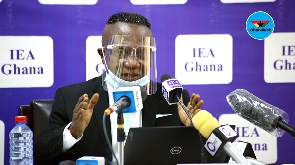 Dr John Kwakye, Research Director, Institute of Economic Affairs (IEA)
Dr John Kwakye, Research Director, Institute of Economic Affairs (IEA)
Ghana’s target of achieving tax-to-GDP of 20 percent by 2023 is unrealistic unless the country’s tax collection and administration is improved significantly, the Institute for Economic Affairs has cautioned.
In its analysis of the 2020 Mid-Year Budget Review and Supplementary Estimate, the IEA projected the country’s tax revenue to remain within 13 percent of GDP within the period.
Finance Minister Ken Ofori Atta last week announced the government’s quest to raise tax revenue to 20 percent of GDP by 2023 as part of measures to revive and strengthen the local economy in the aftermath of the COVID-19 pandemic.
Ghana’s tax-to-GDP ratio has been hovering around 13 percent for a while, far below the 17 percent average amongst sub-Saharan African nations. Despite exceeding tax revenue by some GHS600 million in 2019, its percentage of GDP was 12.2 percent.
The finance minister has already revised his tax revenue estimates downward by GHS6.9 billion from GHS49.2 billion (12.4 percent of GDP) to GHS42.3 billion (11 percent of GDP), due to the reduced economic activity caused by the pandemic.
“We pointed out that Ghana loses as much tax revenue as it collects through various channels, including the informal sector, exemptions, evasion, illicit financial flows, property taxes, fraud, corruption, and administrative lapses. We called for interventions to plug the loopholes in the tax system through strict surveillance and sanctions regimes,” the Director of Research at IEA Dr. John Kwakye said in the statement.
He added that doubling the tax-to-GDP ratio is achievable if the government commits to implement the aforementioned proposed measures.
The IEA urged the government to urgently facilitate the passage of the tax exemption bill which has been languishing before Parliament for 18 months and take measures to improve property tax performance.
“We recognize that some of the interventions we suggested require a longer time to implement than the six months left for the current budget. But at least we expected to see some actions initiated on the more amenable ones in the mid-year budget,” Dr. Kwakye said.